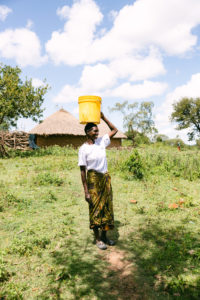Water and climate crises are widening the gender gap: Businesses need to act to address it
This World Water Week, Diageo discusses how investing in water not only invests in the future of women, but also increases business resilience.
By Michael Alexander, Global Head of Water, Environment, Agriculture Sustainability at Diageo | August 31, 2022
Climate impacts are first and foremost felt through water, whether this is too much or too little. This year we’ve seen flooding in South Africa, the current drought across much of Europe and increasing numbers and severity of Atlantic hurricanes. It’s a stark reminder to those of us who don’t usually feel the climate impacts, what a growing and real issue it is, and how it’s deepening in vulnerable communities around the world. And it shows that when we manage our water, we’re more prepared to manage the impacts of climate change.
We’re incredibly fortunate that in many places facing drought this summer we still have access to clean and safe drinking water. Yet one in five people globally don’t have clean water close to their home and one in five people that don’t have a decent toilet of their own.
Women and girls are suffering the most from climate change which is directly linked to water, and they will continue to unless something changes. We co-funded a recent Gender Guidance in partnership with WaterAid (2022), which reflects that women and girls collectively spend over 200 million hour collecting water, every day. With depleting water resources, they must travel further which not only puts their safety at risk, but it reduces their free time and the likelihood of getting an education or employment.

Joyce Mwita, 40 years old farmer, fetching water in Machochwe village, Serengeti, Tanzania. Image: WaterAid.
At Diageo, we passionately believe that access to clean water, sanitation and hygiene (WASH) should be a fundamental human right. Water unlocks the potential of communities, and particularly women, whilst making communities healthier, safer and more resilient to climate impacts. We’ve also committed to replenish water in the water-stressed communities where we operate, and to engage in essential collective action in key water basins, to build water security through collaboration with our peers and wider society.
But what does making a difference look like on the ground? In the last year (July 2021 to July 2022), we delivered 22 WASH projects in eight countries, many in partnership with WaterAid. WASH projects have the objective to improve the water, sanitation and hygiene of the recipients. The pandemic brought to light not only the importance of handwashing but also the lack of facilities in developing countries: in Ghana 40% of healthcare facilities don’t have basic water services. We plumbed in clean and safe water in to Worikambo Health Centre in Ghana, who cares for 7000 people annually, so they have taps to provide drinking water and hand-washing facilities. This not only improved the hygiene of the center but also allowed the doctors and nurses to see more patients each day as they were no longer walking to collect water in the morning.
The above example shows how community resilience increased as they had safe and hygienic healthcare and were able to receive care more quickly. And whilst it builds community resilience, it also builds business resilience, so is an investment worth making. In partnership with WaterAid and other FMCG companies, we carried out a four-year study to see the investment results for ourselves. The research showed that in a factory setting, for every $1 invested in WASH facilities, there was a $1.32 return on investment, and in tea sector projects, this grew to $2.01. This is down to overall absences at work decreasing, productivity increasing and workplace incidents decreasing. It also showed that the results were best when WASH services were installed in the employees’ community which also benefitted employee families.
Whilst investing in WASH facilities is one way to manage your climate risk, climate and water must be taken holistically. It needs to be accompanied by a reduction in water use, efficient water recycling and water replenishment. If you’re at the start of your WASH investment seek advice and work with organisations such as WaterAid or water.org and join initiatives such as WASH4Work, the Water Resilience Coalition and the UNGC CEO Water Mandate. Water is a shared resource and it’s only when we collaborate, knowledge share and support each other that we’ll be able to make a lasting and crucial change.
As we look ahead to COP27, there has never been a more urgent time to act on water, to adapt to climate change and to join the UNFCCC’s Race to Resilience. We recognise that climate adaptation needs a loud, vocal campaign to ensure everyone recognises that the impacts of climate change, particularly on women, need to be addressed now – and we all need companies, governments, NGOs and civil society to work together to address the current climate and associated water crises.
You can read more on Diageo’s environmental, social and governance commitments in their Society 2030: The Spirit of Progress at Diageo.com


